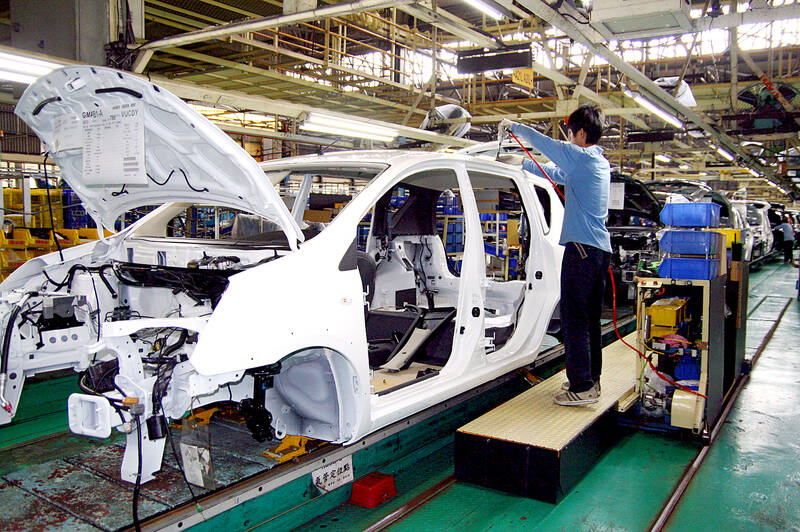Yulon Motor Co (裕隆汽車) yesterday said that total new vehicle sales in Taiwan this year would likely drop below last year’s level as buyers wait on the sidelines amid lingering tariff worries.
Taiwan is conducting tariff negotiations with the US after Washington announced a 90-day pause to “reciprocal” tariffs early last month. Authorities are also under pressure to reduce duties on imported vehicles or scrap commodity taxes on vehicles to ease US concerns.
“We assume the effect of policy changes on the automobile industry should be felt ... but there is no way to predict” their extent, Yulon spokesman Steven Lo (羅文邑) told an online earnings conference.

Photo: CNA
The firm said it would maintain close communications with authorities as the tariff issue weighs on the domestic automobile industry and the tens of thousands of companies in its supply chain.
Last year, total new vehicle sales in Taiwan fell by 4 percent from a year earlier to 457,837 units after growing 12 percent annually to 477,009 units in 2023, government data showed.
Regarding exchange rate fluctuations, every NT$1 change would affect Yulon’s revenue by about NT$60 million (US$1.99 million), but the overall impact on the company’s operating income is not significant, as Yulon could pass on cost changes in material procurement to downstream suppliers, Lo said.
However, with the absence of clear policy support, market sentiment remains conservative and the company expects overall vehicle sales in Taiwan this year to fall below 450,000 units.
Yulon’s downbeat forecast came as sales of new vehicles in Taiwan in the first four months of the year dropped 11.4 percent annually to 132,733 units.
The weakening demand in the domestic market led the company to report consolidated revenue of NT$17.59 billion in the first quarter, down 15.24 percent from the same period a year earlier.
Faced with falling sales and lower investment income, Yulon said net profit in the first quarter fell 49.7 percent year-on-year to NT$436 million, or earnings per share of NT$0.42.
The company, which has a long-term partnership with Nissan Motor Co, said it is paying close attention to the Japanese automaker’s organizational adjustments and overseas factory closures, but added that Nissan’s Taiwanese supply system is still operating normally.
On a positive note, Yulon is to manufacture electric vehicles (EVs) in Taiwan for Mitsubishi Motors Corp based on a model developed by Foxtron Vehicle Technologies Co (鴻華先進), its joint venture with Hon Hai Precision Industry Co (鴻海精密).
Yulon plans to start shipping its first EV model for Mitsubishi to the New Zealand and Australian markets next year, it said.
As for domestic EV sales, insufficient EV infrastructure has capped the growth of its Luxgen models, with sales down 10 percent to 1,391 units in the first four months.

Popular vape brands such as Geek Bar might get more expensive in the US — if you can find them at all. Shipments of vapes from China to the US ground to a near halt last month from a year ago, official data showed, hit by US President Donald Trump’s tariffs and a crackdown on unauthorized e-cigarettes in the world’s biggest market for smoking alternatives. That includes Geek Bar, a brand of flavored vapes that is not authorized to sell in the US, but which had been widely available due to porous import controls. One retailer, who asked not to be named, because

Real estate agent and property developer JSL Construction & Development Co (愛山林) led the average compensation rankings among companies listed on the Taiwan Stock Exchange (TWSE) last year, while contract chipmaker Taiwan Semiconductor Manufacturing Co (TSMC, 台積電) finished 14th. JSL Construction paid its employees total average compensation of NT$4.78 million (US$159,701), down 13.5 percent from a year earlier, but still ahead of the most profitable listed tech giants, including TSMC, TWSE data showed. Last year, the average compensation (which includes salary, overtime, bonuses and allowances) paid by TSMC rose 21.6 percent to reach about NT$3.33 million, lifting its ranking by 10 notches

CHIP DUTIES: TSMC said it voiced its concerns to Washington about tariffs, telling the US commerce department that it wants ‘fair treatment’ to protect its competitiveness Taiwan Semiconductor Manufacturing Co (TSMC, 台積電) yesterday reiterated robust business prospects for this year as strong artificial intelligence (AI) chip demand from Nvidia Corp and other customers would absorb the impacts of US tariffs. “The impact of tariffs would be indirect, as the custom tax is the importers’ responsibility, not the exporters,” TSMC chairman and chief executive officer C.C. Wei (魏哲家) said at the chipmaker’s annual shareholders’ meeting in Hsinchu City. TSMC’s business could be affected if people become reluctant to buy electronics due to inflated prices, Wei said. In addition, the chipmaker has voiced its concern to the US Department of Commerce

STILL LOADED: Last year’s richest person, Quanta Computer Inc chairman Barry Lam, dropped to second place despite an 8 percent increase in his wealth to US$12.6 billion Staff writer, with CNA Daniel Tsai (蔡明忠) and Richard Tsai (蔡明興), the brothers who run Fubon Group (富邦集團), topped the Forbes list of Taiwan’s 50 richest people this year, released on Wednesday in New York. The magazine said that a stronger New Taiwan dollar pushed the combined wealth of Taiwan’s 50 richest people up 13 percent, from US$174 billion to US$197 billion, with 36 of the people on the list seeing their wealth increase. That came as Taiwan’s economy grew 4.6 percent last year, its fastest pace in three years, driven by the strong performance of the semiconductor industry, the magazine said. The Tsai